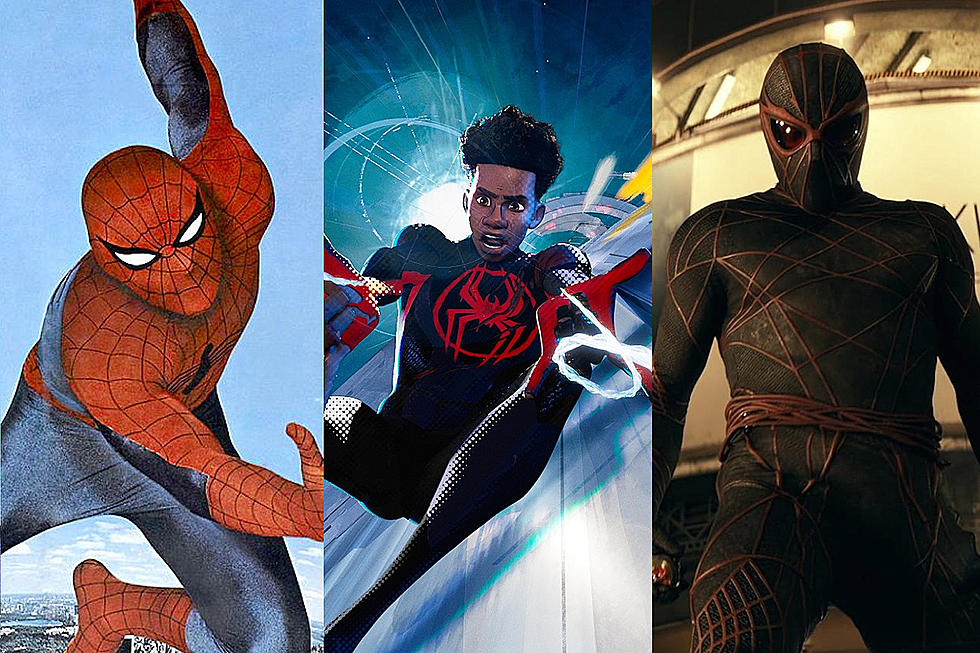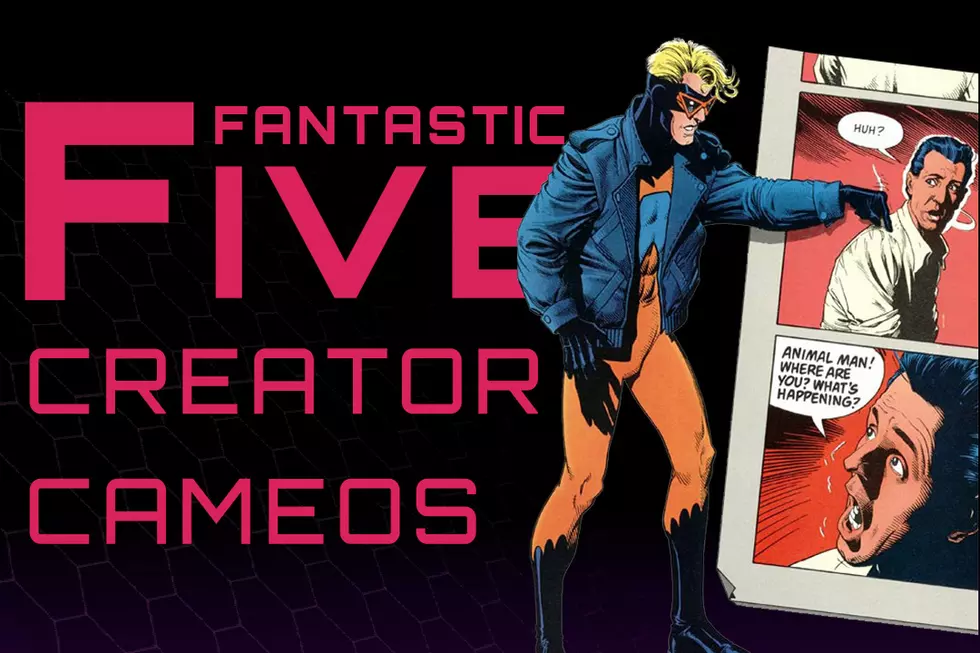
50 Years Later: Growth And Maturity in Amazing Spider-Man 1-50

In the beginning, Peter Parker was fifteen years old. He was too young for full manhood, but too old to be treated like a child. He was coddled by his family and abused by his peers. He was a beloved nephew and professional wallflower, a bitter bookworm and great student. Then he got bitten by a radioactive spider and everything changed. He became Spiderman first, and then Spider-Man. He grew up, moved out, found friends, discovered love, lost love, found love again, and became a man. The first 50 issues of Amazing Spider-Man chart the growing pains of Steve Ditko and Stan Lee's baby boy, and show us something rare in cape comics: true and gradual growth.
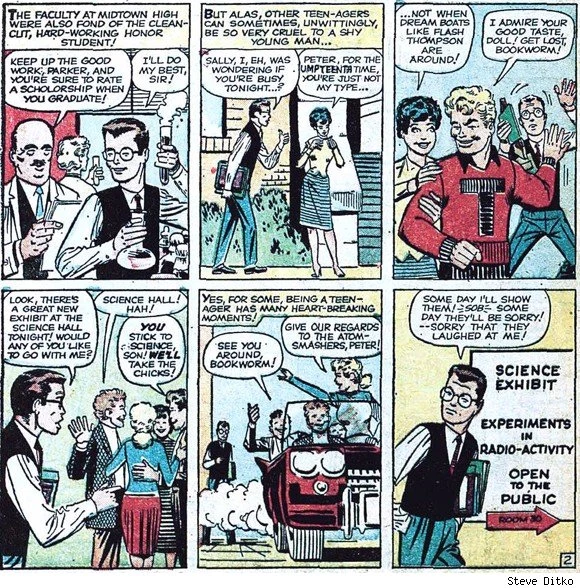
Peter Parker shouldn't have been a hero. He was never the big man on campus. He was barely even a little man on campus. He was just a nerd who got picked on and did well in school. He wasn't just a nerd, actually. He was a bitter nerd, one who internalized all of the hate that people showered on him and let it turn him into a jerk. Peter Parker isn't a character who gets powers and becomes a hero. He's a character who gets powers and becomes a villain.
In Amazing Fantasy 15, immediately after creating his costume and web shooters, Parker thinks, "So, they laughed at me for being a bookworm, eh? Well, only a science major could have created a device like this!" He's the kind of nerd that looks down on other people, the "Heh, I guess you're jealous of my intellect ;)" nerd.
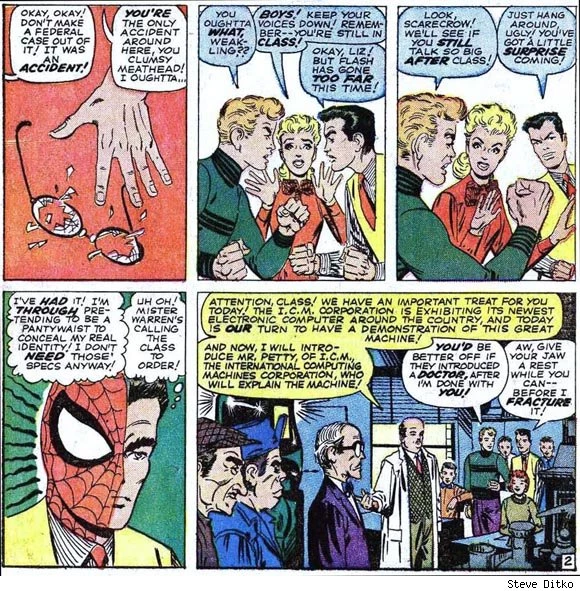
He wasn't hero material, not in the way that Bruce Wayne or Clark Kent or Steve Rogers were. He didn't have the natural selflessness or powerful drive for revenge that define those men. He just had his smarts, a bitter heart, and a good family at his back. Sometimes that's enough. A lot of the time, though, it isn't. Peter Parker needed a tragic push to be put on the right path.
I'll tell anyone who'll listen that Spider-Man is the ultimate superhero, the best superhero. Ditko and Lee created a character who redefined superheroes for the better, and they did it by not just exploring what happens when the wrong person gets powers, but by showing us the process of him growing into his heroism and all his failed counterparts. We get to see what truly makes a hero, and the answer is will, heart, and experience.
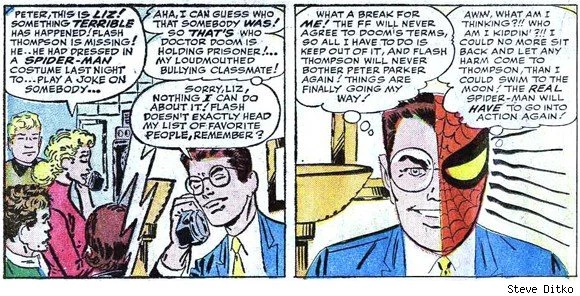
Peter Parker, as a character, is not the type of person you would like to hang out with. He's deeply insecure, as a result of being bullied and coddled perhaps, and that insecurity manifests itself as extraordinary arrogance and self-centeredness. Parker spends many of those early issues railing against unfairness and his enemies. He has an "If only they knew" point of view, one that reinforces his own perception of himself as an underdog and loser. Even after successful moments of heroism, like when he rescued John Jameson from a botched space launch, his first thought is of himself, and how even J. Jonah Jameson would hire him now.

But it makes sense. I figure somewhere around 50% of you out there remember being a teenaged boy. Do you remember that thirst for being seen as a man? Being seen as self-sufficient, cool, and intelligent? Showing the world that the you inside your shell was just as cool as the coolest guy in school, if not cooler? That's where Spider-Man begins, from that position of deep longing and thirst. He wants to be seen a certain way.
You can see it in how Spider-Man behaves. Keep in mind that Peter Parker was a teenager when he became a hero. He doesn't know how to be a man. He simply hasn't had the experience yet. But, he suits up anyway, and he pointedly takes the name Spider-Man, which is a statement in and of itself. And how does Peter Parker, 15-year-old boy, act when he pulls on the red'n'blues?

He acts like a hero. He doesn't show fear, not usually. He treats his villains, a surprising number of which are double or triple his age, like peers. He condescends to them. He quips. He acts like a man. And he saves the day. He's acting like a hero, he's emulating his heroes. He's pretending, back in those early days. He's not Spider-Man yet. Spider-Man isn't the true Peter Parker. It's just a face he wears sometimes.
One thing that is really resonant about early Spider-Man tales is that he constantly questions his life. He knows that he's been given his power for a reason -- despite no evidence to that effect -- but he still wonders if he's "more interested in the adventure of being Spider-Man than [he is] in helping people." What's the use of it all? Where is he going? He's a teenager and he's being buried under an enormous burden. He cracks sometimes, as teenagers are wont to do, but he refuses to show that side of himself to other people.
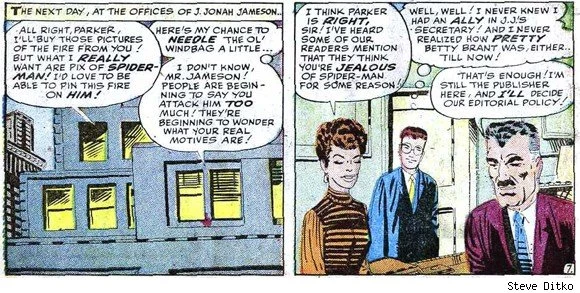
The widening of his supporting cast, the best supporting cast in comics, broadened Peter Parker's horizons. He met girls, and was such a teenager about it. He only notices Betty Brant after she defends Parker and Spider-Man in a meeting. "Well, well!" thinks the teenager. "I never knew I had an ally in JJ's secretary! And I never realized how pretty Betty Brant was, either... till now!"
While a lady saying nice things about you is in no way a confirmation that she digs you (take note, fellas!), Betty definitely dug Parker, and they embarked on a doomed May-December, or maybe just May-July, romance. Betty Brant was an "older" woman in that she's, at best, in her very, very early twenties, but what's more amazing than that when you're a teenager?
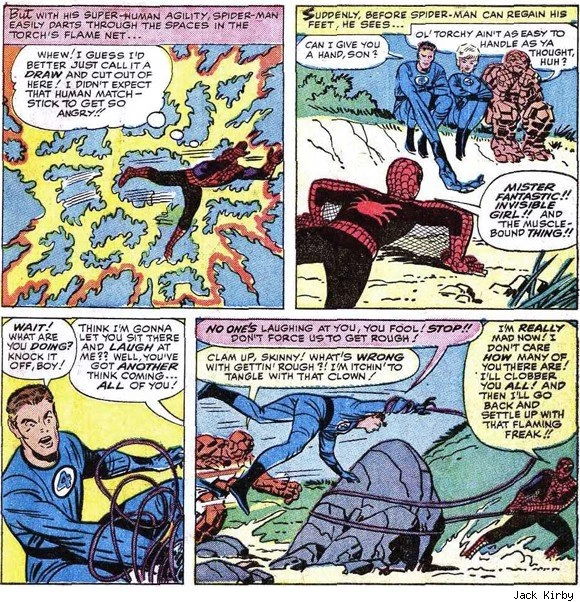
As Amazing Spider-Man continued on, Peter actually grew up. He graduated high school in issue 28, with honors, and continued on to Empire State University. What happens in college? You grow up. You have actual relationships with other people, instead of the halting and exciting high school relationships. You learn how to be an adult. You figure out who you are.
John Romita Sr. took over drawing Amazing Spider-Man for the college years. If Ditko's pencils were best-described as a moody and melancholy indie movie, Romita brought in soap opera-style beauty and romance to the series. We find out that your friendly neighborhood wallflower is actually a pretty good-looking dude, and his supporting cast is full of pretty people. Romita changed the tone of the book from one man's struggle against the world to one man's attempts to fit into the world.
Just like in real life, Peter Parker matured as time wore on. He lost a lot of his nervousness around being Spider-Man, though he was often tempted to hang up the tights. One side effect of being Spider-Man for so long, though, is that the line between Peter Parker and Spider-Man began to blur.
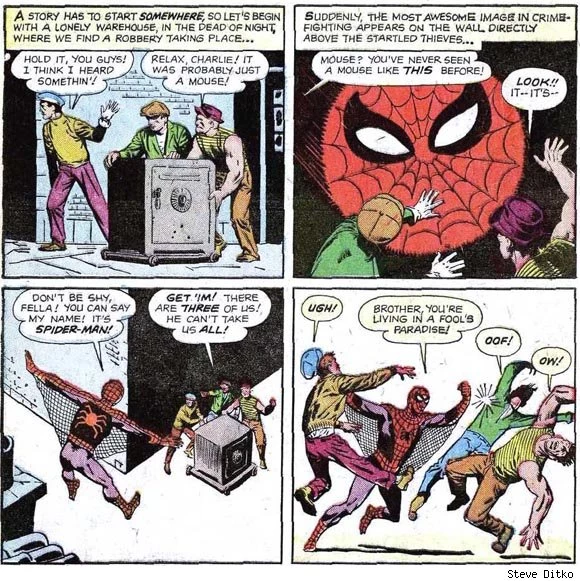
There's a clear difference between the two early on, and it's obvious that Parker is playing a role. But as Parker gets older, he starts becoming more popular, like everyone experiences after surviving high school. He jokes with friends, and he carries himself better. He doesn't walk with his head down in an attempt to dodge the slings and arrows of his peers any more. He flirts with girls without being shy or awkward about it, a prospect that was unbelievable and unlikely when he first got bitten.
He becomes friends with Flash Thompson, kinda, and has a good time with Mary Jane Watson, Gwen Stacy, and Harry Osborn. He builds up a wall of good friends around himself, people he can rely on and who rely on him, and he is undeniably better for it. He experiences love and gets a taste of life on his own. More importantly... he stops being so alone.
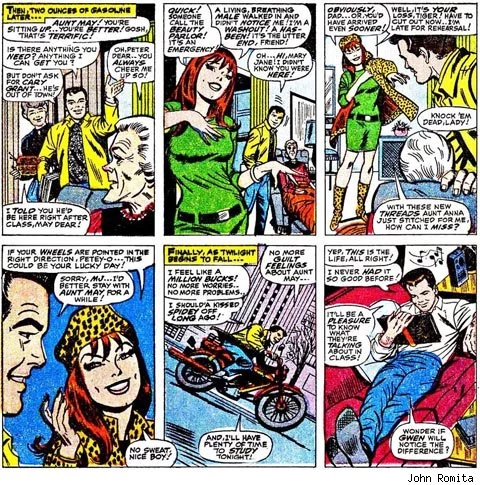
In Amazing Spider-Man 50, a Stan Lee/John Romita/Mickey Dimeo/Sam Rosen joint, Peter Parker's resolve slips. His aunt gets sick, and he's confronted with the fact that he was out protecting people who hate him instead of spending time with the people who love him. The pressure gets to him, and he falls back on those bad old thoughts about why he goes out as Spider-Man. "Being Spider-Man has brought me nothing," he says, "but unhappiness! In order to satisfy my craving for excitement... I've jeopardized everything that really matters -- Aunt May -- my friends -- the girls in my life... and for what...??"
He thinks, just for a moment, that being Spider-Man is an unfair and irresponsible burden, something that he's doing for a lark, instead of something that must be done. He's feeling it, and he quits being Spider-Man. He's relapsed to his teenaged years, the years when he was less sure of himself and more bitter, and he chooses to put his toys away and become a man.

It's the wrong decision, of course. He's forced back into action, because that's how these stories go, and he realizes something important. He can do things that no one else can. Being Spider-Man isn't irresponsible or a shirking of his familial duties. He can help people, and since he has the power to do so, there's no reason why he shouldn't. Part of being an adult is being willing to shoulder burdens that no one else will, being willing to put your family and others before yourself in the name of making their life better. Being an adult is about self-sacrifice. It's about balancing your responsibilities and understanding you can't do everything. Being an adult is about spitting in pain's face.

Peter Parker got lucky. He had a family that loved him, and they did their best to teach him right and wrong and prepare him for life as an adult. He didn't get it when he was a teenager, but precious few of us did. But as he grew, as he gained life experience and friends, he came to understand that being Spider-Man isn't a thing you do just because you can, or to get a thrill, or to show people how awesome you are because you feel inadequate. Being Spider-Man is about being a hero, saving lives, and making the world a better place. Peter Parker becomes Spider-Man because it is something he must do, because otherwise he's squandering his gift, disrespecting the way his aunt and uncle raised him, and wasting the life lessons he's learned from his friends and enemies.
The first 140-odd issues of Amazing Spider-Man are my Lee/Kirby Fantastic Four. There's a purity there that I greatly enjoy, and the first fifty issues tell the story of a boy becoming a man even while they show us what happens when a boy becomes a hero. We see Peter Parker at his most sour and most vibrant, and when he puts that costume back on, we understand exactly why. We see him grow up over the course of four or five years, long enough for being Spider-Man to become second-nature and long enough for Peter Parker to grow into a fully-realized adult. He goes from zero to hero, and that happens slowly, almost in real-time, instead of in his debut issue.

All his rough edges weren't sanded down by the end of these fifty issues, but you can see where the man is going. There are several milestones that come later -- Gwen's death, Mary Jane deciding to stay with Peter after Gwen dies, the death of Harry Osborn -- but these first fifty issues are as good a superhero origin as you'll find. The best, even.
Time slows down for Spider-Man after this. He stopped aging, and he settled into the state we now know, a permanent purgatory of somewhere between 24 and 28 years old. Which is fine, of course. It is what it is. But I can't help but wonder what would've happened if Peter Parker kept aging like he did in these original issues. He could've aged, gotten married, and retired. How would he have changed?

There's something special about a superhero story that demonstrates real, genuine growth. It's rare, especially amongst marquee characters. Batman today is essentially the same person he was ten and twenty years ago. He has a few more scars, sure, but personality-wise? Same character. He never got a chance to go through the epiphanies and horrendous setbacks that Peter Parker experienced. He jumped straight to the sidekicks and fitted-out caves and sexually-charged relationships with a few of his villains.
Steve Ditko, Stan Lee, and John Romita created some of my favorite comics while working on Amazing Spider-Man, and one of my favorite complete stories. They showed us what it's like to see a hero grow up, and though those days are long gone, I'm eternally thankful to them for their work.

More From ComicsAlliance
